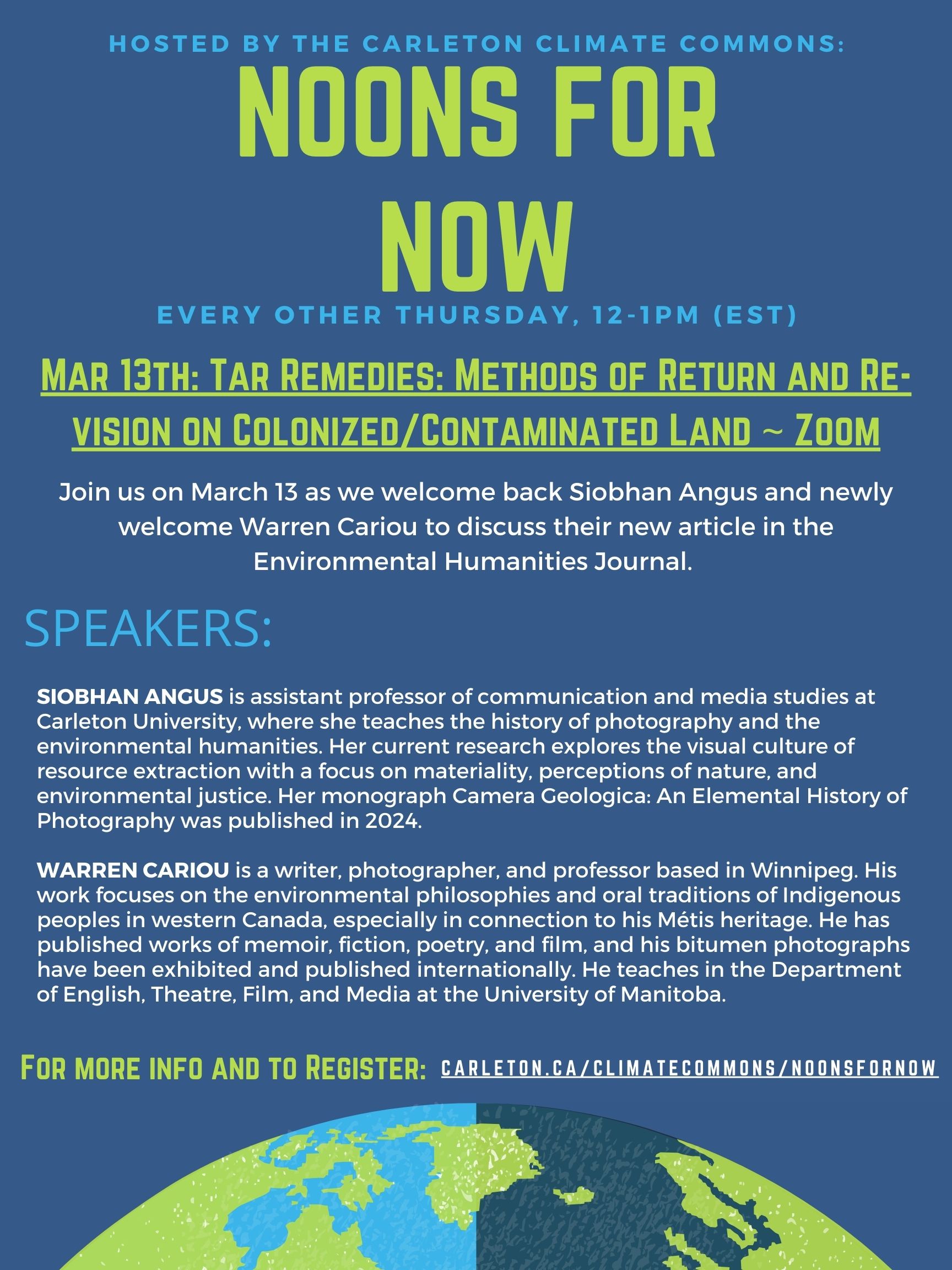
March 13: Siobhan Angus and Warren Cariou: “Tar Remedies: Methods of Return and Re-vision on Colonized/Contaminated Land”
Join us on March 13 as we welcome back Siobhan Angus and newly welcome Warren Cariou to discuss their new article in the Environmental Humanities Journal. “This two-part essay turns to the landscapes of bitumen mining in the Athabasca tar sands in western Canada. Despite the environmental costs of the tar sands mining process, the Canadian state remains invested in oil extraction in the tar sands. Starting from the premise that the extraction and burning of this bitumen was and is not inevitable, this dialogue locates hazardous hope in the landscapes of the Athabasca region. To do so, the first section is an analysis of Warren Cariou’s photographic practice, situating his work within themes of toxicity and hope. Written by an art historian, it argues that we can read the petrographs through a mode of critical spectatorship that generates questions about how extraction makes our world and how these processes are historically contingent choices based in what society has chosen to value. The second part is a short reflection by Warren Cariou on his practice and how he theorizes hope in the context of pollution.”
Speakers:
SIOBHAN ANGUS is assistant professor of communication and media studies at Carleton University, where she teaches the history of photography and the environmental humanities. Her current research explores the visual culture of resource extraction with a focus on materiality, perceptions of nature, and environmental justice. Her monograph Camera Geologica: An Elemental History of Photography was published in 2024.
WARREN CARIOU is a writer, photographer, and professor based in Winnipeg. His work focuses on the environmental philosophies and oral traditions of Indigenous peoples in western Canada, especially in connection to his Métis heritage. He has published works of memoir, fiction, poetry, and film, and his bitumen photographs have been exhibited and published internationally. He teaches in the Department of English, Theatre, Film, and Media at the University of Manitoba.
Actions
- Be mindful of how extraction shapes our world and how these processes are historically conditioned decisions depending on what society has chosen to value.
- Familiarize yourself with materials such as Bitumen which forms extreme hazards to our life through the industrial process of extractivism.
- Taking on the question of how to value things is crucial and creating different ways to learn how to value these things is just as important
- Understand our human relationship to the natural world and our collective responsibility for maintaining and fostering those relationships.
- Grasp the contradiction and the contrasting relations we have to pollution, hope, and bitumen mining in the tar sands landscape.
- Recognize how oil extraction reshapes our earth, such as the Athabasca region, turning a boreal landscape that is the traditional territory of Metis, Dene, and Cree nations into an environmental sacrifice zone.
- Being ambiguous is not necessarily inherently a bad thing, it can really encourage critical thinking and creativity because of the many perspectives it offers. Embracing the various perspectives and uncertainty can open ourselves up to different interpretations that we may not have considered had there not been ambiguous considerations.
Resource List
Websites:
- https://www.warrencariou.com/
- https://www.siobhanangus.com/
- Mining Watch Canada
- Toxic Legacies
- Struts Gallery – The Paydirt Seminars
Articles:
- Tar Remedies: Methods of Return and Re-vision on Colonized/Contaminated Land
- Warren Cariou – “Petrography and Bitumen Poetics,” Canadian Literature, Issue 251, Dec. 2022.
- Petrography, The Tar Sands Paradise, and the Medium of Modernity, Warren Cariou and Jon Gordon
- Tarhands: A Messy Manifesto
- Beyond Wiindigo Infrastructure
- Sabrina Fernandes – Sacrifice Zones
- Todd, Z. Fossil Fuels and Fossil Kin: An Environmental Kin Study of Weaponised Fossil Kin and Alberta’s So‐Called “Energy Resources Heritage”. Antipode anti.12897 (2022) doi:10.1111/anti.12897.
- Todd, Z. Fish, Kin and Hope: Tending to Water Violations in amiskwaciwâskahikan and Treaty Six Territory. Afterall: A Journal of Art, Context and Enquiry 43, 102–107 (2017).
- Deborah Bird Rose. “Shimmer: When All You Love Is Being Trashed.” Arts of Living on a Damaged Planet: Ghosts and Monsters of the Anthropocene. 51-63 (2017).
- Ray, S. J. Environmental Justice, Vital Materiality, and the Toxic Sublime in Edward Burtynsky’s Manufactured Landscapes. GeoHumanities 2, 203–219 (2016).
- Peeples, J. Toxic Sublime: Imaging Contaminated Landscapes. Environmental Communication 5, 373–392 (2011).
- Nisbet, J. Environmental Abstraction and the Polluted Image. American Art 31, 114–131 (2017).
- Spiegel, S. J. et al. Visual Storytelling, Intergenerational Environmental Justice and Indigenous Sovereignty: Exploring Images and Stories amid a Contested Oil Pipeline Project. IJERPH 17, 2362 (2020).
- Liboiron, M., Tironi, M. & Calvillo, N. Toxic politics: Acting in a permanently polluted world. Soc Stud Sci 48, 331–349 (2018).
- Levin, B. & Ruelfs, E. À propos de l’exposition Mining Photography. The Ecological Footprint of Image Production. transbordeur 8, 122–131 (2024).
Books:
- Camera Geologica: An Elemental History of Photography, Shiobhan Angus
- Pollution Is Colonialism, Max Liboiron
- Braiding Sweetgrass, Robin Kimmerer
- Slow Violence and the Environmentalism of the Poor, Rob Nixon
- Staying with the Trouble: Making Kin in the Cthulucene, Donna J. Haraway
- Petrocultures: Oil, politics, culture, edited by Sheena Wilson, Adam Carlson, Imre Szeman
- Rehearsals for Living, Leanne Simpson and Robin Maynard
- Arsenic mon amour: Letters of Love and Rage, Jean-Lou David & Gabrielle Izaguirré-Falardeau
Other Media:
- The Chemical Valley Project Play/Documentary
- McArthur, Neil, and Cariou, Warren, dirs. Land of Oil and Water: Aboriginal Voices on Life in the Oil Sands. 2009
Share: Twitter, Facebook
Short URL:
https://carleton.ca/climatecommons/?p=4346